Guided Reflection on Aboriginal and Torres Strait Islander Healthcare
VerifiedAdded on 2022/10/17
|7
|1726
|9
Report
AI Summary
This report is a guided reflection by a student, analyzing their evolving understanding of Aboriginal and Torres Strait Islander healthcare within the context of a Contemporary Indigenous Health and Wellbeing course. The student utilizes the Gibbs reflective cycle to evaluate three specific learning activities, exploring their initial assumptions, experiences, and the impact of the course content on their beliefs and values. The reflection addresses key themes such as cultural safety, the impact of racism in healthcare, and the importance of incorporating diverse perspectives. The student reflects on the significance of understanding cultural practices, the role of healthcare professionals as cultural liaisons, and the need for inclusive healthcare practices. They also discuss the importance of programs such as personal care services and the need for healthcare providers to improve their communication and cultural competence to provide better care for Indigenous populations. The report draws on research to highlight the challenges faced by Aboriginal and Torres Strait Islander people within the healthcare system and proposes strategies to improve health outcomes and reduce disparities.
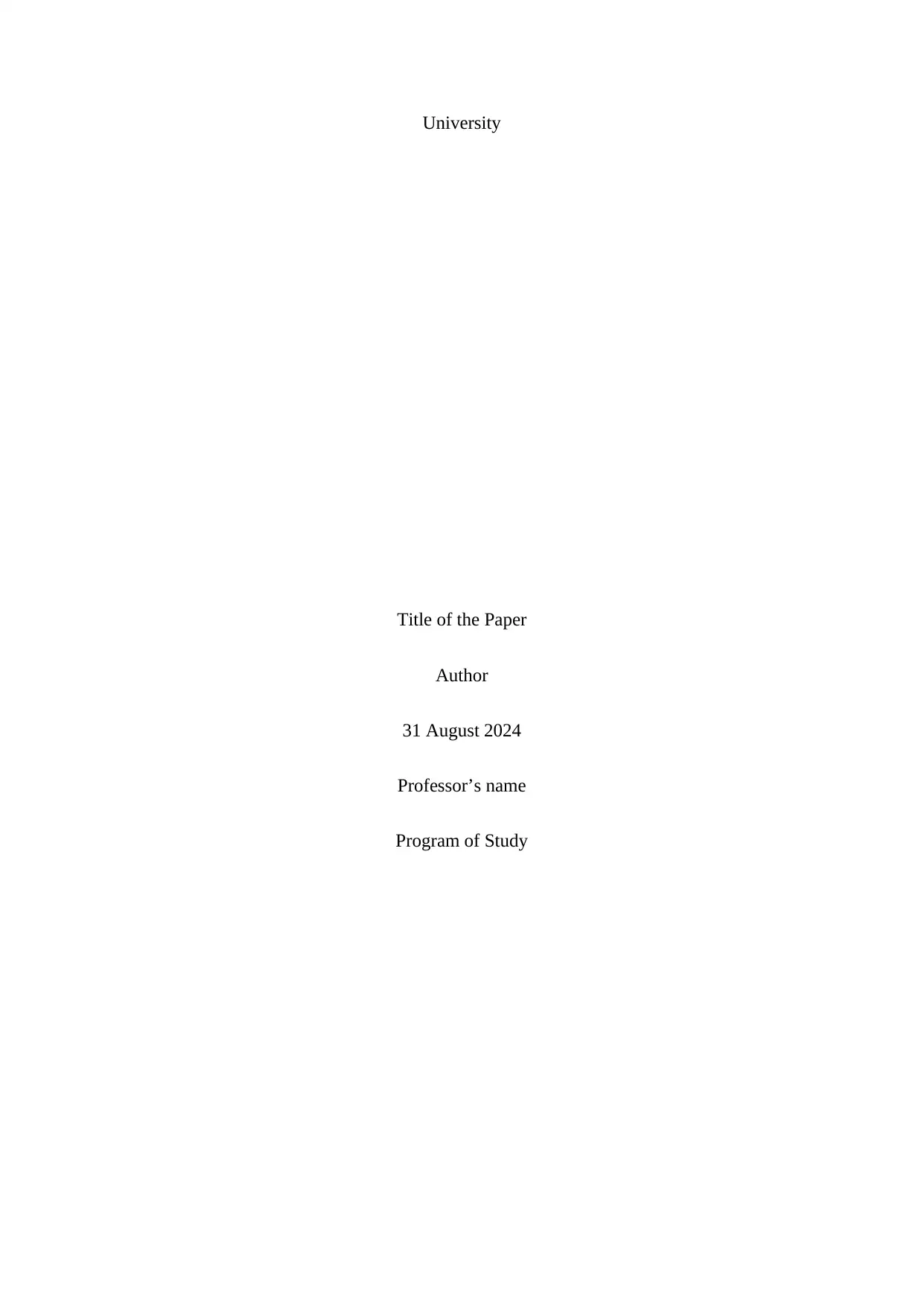
University
Title of the Paper
Author
31 August 2024
Professor’s name
Program of Study
Title of the Paper
Author
31 August 2024
Professor’s name
Program of Study
Paraphrase This Document
Need a fresh take? Get an instant paraphrase of this document with our AI Paraphraser
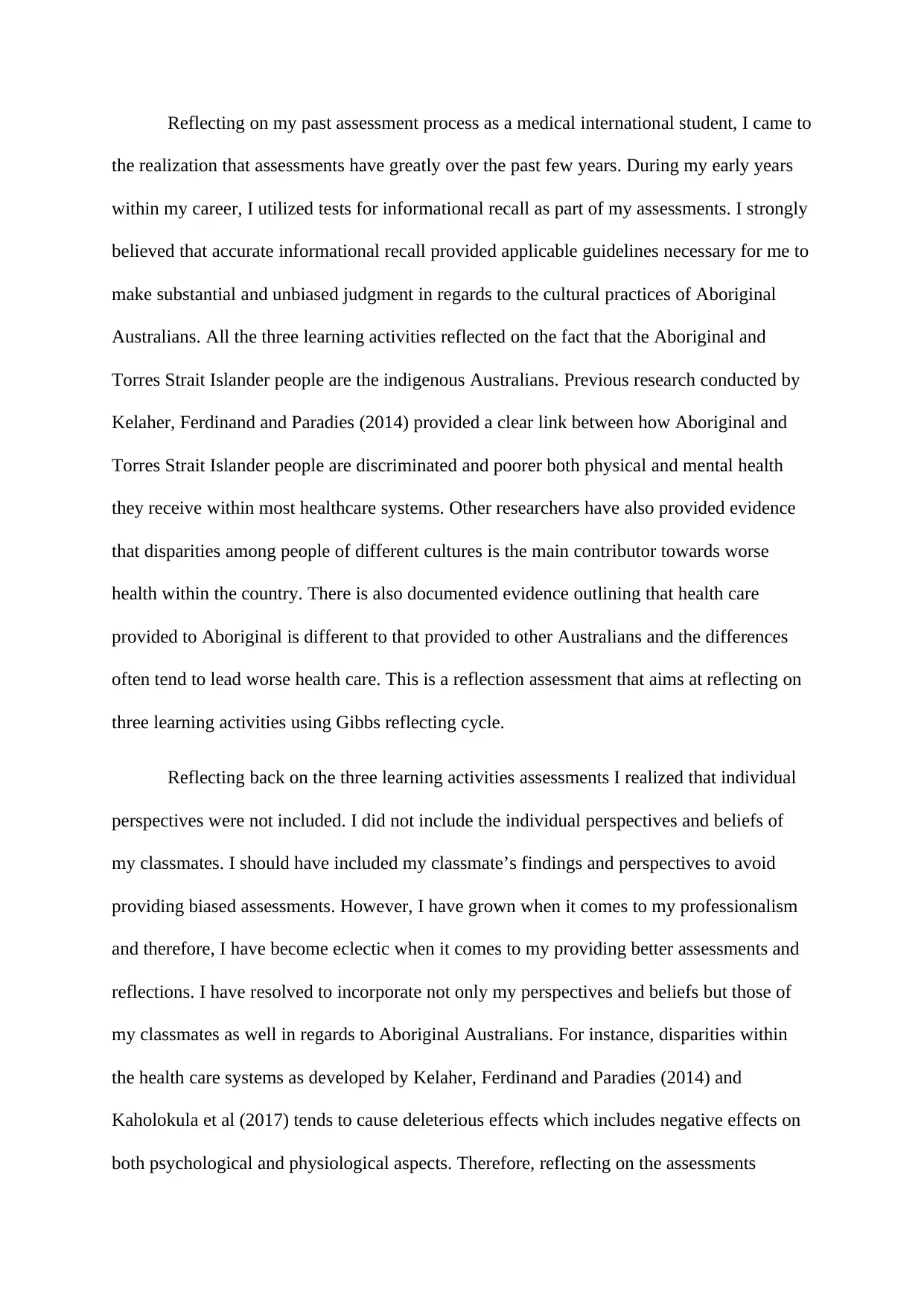
Reflecting on my past assessment process as a medical international student, I came to
the realization that assessments have greatly over the past few years. During my early years
within my career, I utilized tests for informational recall as part of my assessments. I strongly
believed that accurate informational recall provided applicable guidelines necessary for me to
make substantial and unbiased judgment in regards to the cultural practices of Aboriginal
Australians. All the three learning activities reflected on the fact that the Aboriginal and
Torres Strait Islander people are the indigenous Australians. Previous research conducted by
Kelaher, Ferdinand and Paradies (2014) provided a clear link between how Aboriginal and
Torres Strait Islander people are discriminated and poorer both physical and mental health
they receive within most healthcare systems. Other researchers have also provided evidence
that disparities among people of different cultures is the main contributor towards worse
health within the country. There is also documented evidence outlining that health care
provided to Aboriginal is different to that provided to other Australians and the differences
often tend to lead worse health care. This is a reflection assessment that aims at reflecting on
three learning activities using Gibbs reflecting cycle.
Reflecting back on the three learning activities assessments I realized that individual
perspectives were not included. I did not include the individual perspectives and beliefs of
my classmates. I should have included my classmate’s findings and perspectives to avoid
providing biased assessments. However, I have grown when it comes to my professionalism
and therefore, I have become eclectic when it comes to my providing better assessments and
reflections. I have resolved to incorporate not only my perspectives and beliefs but those of
my classmates as well in regards to Aboriginal Australians. For instance, disparities within
the health care systems as developed by Kelaher, Ferdinand and Paradies (2014) and
Kaholokula et al (2017) tends to cause deleterious effects which includes negative effects on
both psychological and physiological aspects. Therefore, reflecting on the assessments
the realization that assessments have greatly over the past few years. During my early years
within my career, I utilized tests for informational recall as part of my assessments. I strongly
believed that accurate informational recall provided applicable guidelines necessary for me to
make substantial and unbiased judgment in regards to the cultural practices of Aboriginal
Australians. All the three learning activities reflected on the fact that the Aboriginal and
Torres Strait Islander people are the indigenous Australians. Previous research conducted by
Kelaher, Ferdinand and Paradies (2014) provided a clear link between how Aboriginal and
Torres Strait Islander people are discriminated and poorer both physical and mental health
they receive within most healthcare systems. Other researchers have also provided evidence
that disparities among people of different cultures is the main contributor towards worse
health within the country. There is also documented evidence outlining that health care
provided to Aboriginal is different to that provided to other Australians and the differences
often tend to lead worse health care. This is a reflection assessment that aims at reflecting on
three learning activities using Gibbs reflecting cycle.
Reflecting back on the three learning activities assessments I realized that individual
perspectives were not included. I did not include the individual perspectives and beliefs of
my classmates. I should have included my classmate’s findings and perspectives to avoid
providing biased assessments. However, I have grown when it comes to my professionalism
and therefore, I have become eclectic when it comes to my providing better assessments and
reflections. I have resolved to incorporate not only my perspectives and beliefs but those of
my classmates as well in regards to Aboriginal Australians. For instance, disparities within
the health care systems as developed by Kelaher, Ferdinand and Paradies (2014) and
Kaholokula et al (2017) tends to cause deleterious effects which includes negative effects on
both psychological and physiological aspects. Therefore, reflecting on the assessments
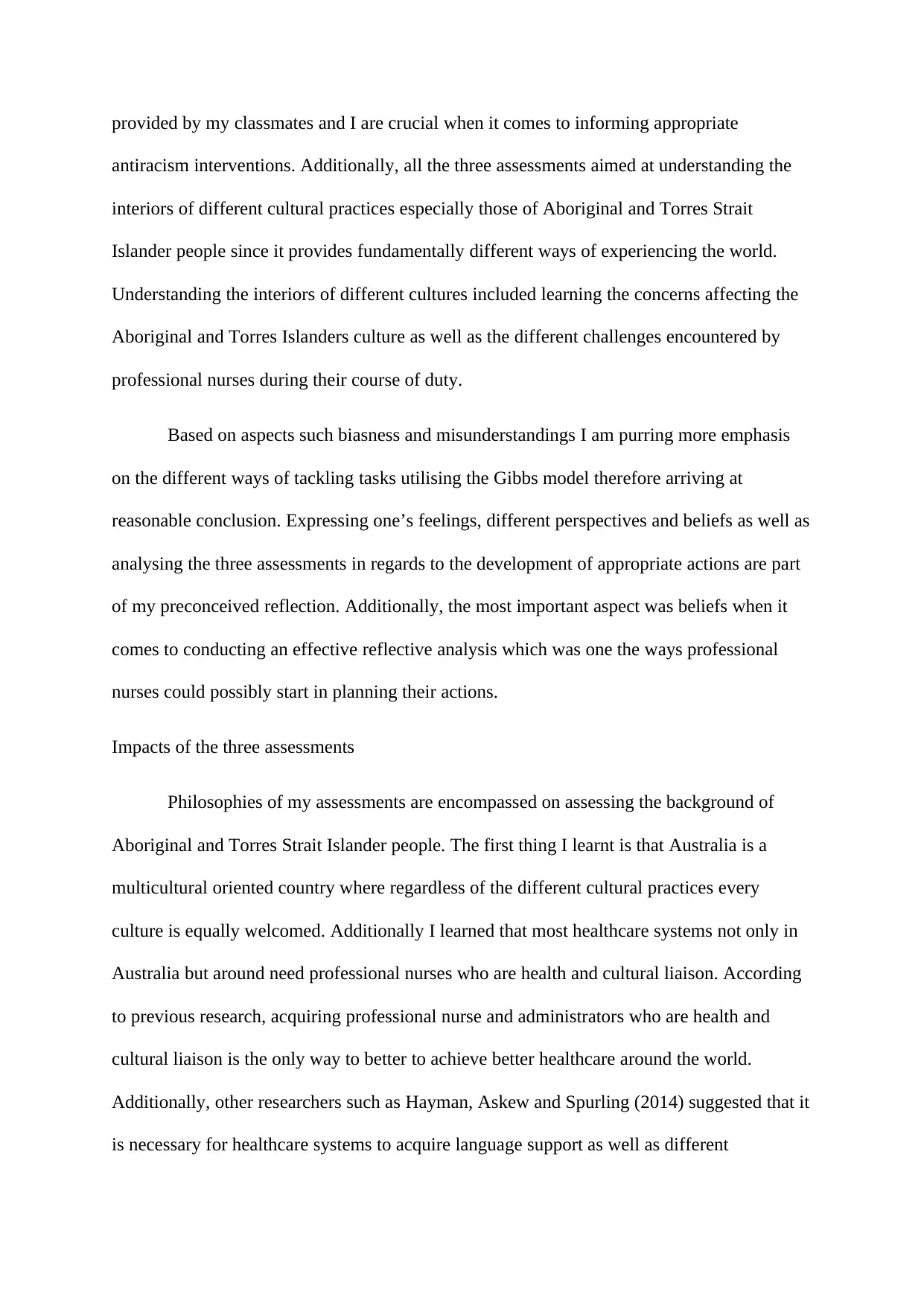
provided by my classmates and I are crucial when it comes to informing appropriate
antiracism interventions. Additionally, all the three assessments aimed at understanding the
interiors of different cultural practices especially those of Aboriginal and Torres Strait
Islander people since it provides fundamentally different ways of experiencing the world.
Understanding the interiors of different cultures included learning the concerns affecting the
Aboriginal and Torres Islanders culture as well as the different challenges encountered by
professional nurses during their course of duty.
Based on aspects such biasness and misunderstandings I am purring more emphasis
on the different ways of tackling tasks utilising the Gibbs model therefore arriving at
reasonable conclusion. Expressing one’s feelings, different perspectives and beliefs as well as
analysing the three assessments in regards to the development of appropriate actions are part
of my preconceived reflection. Additionally, the most important aspect was beliefs when it
comes to conducting an effective reflective analysis which was one the ways professional
nurses could possibly start in planning their actions.
Impacts of the three assessments
Philosophies of my assessments are encompassed on assessing the background of
Aboriginal and Torres Strait Islander people. The first thing I learnt is that Australia is a
multicultural oriented country where regardless of the different cultural practices every
culture is equally welcomed. Additionally I learned that most healthcare systems not only in
Australia but around need professional nurses who are health and cultural liaison. According
to previous research, acquiring professional nurse and administrators who are health and
cultural liaison is the only way to better to achieve better healthcare around the world.
Additionally, other researchers such as Hayman, Askew and Spurling (2014) suggested that it
is necessary for healthcare systems to acquire language support as well as different
antiracism interventions. Additionally, all the three assessments aimed at understanding the
interiors of different cultural practices especially those of Aboriginal and Torres Strait
Islander people since it provides fundamentally different ways of experiencing the world.
Understanding the interiors of different cultures included learning the concerns affecting the
Aboriginal and Torres Islanders culture as well as the different challenges encountered by
professional nurses during their course of duty.
Based on aspects such biasness and misunderstandings I am purring more emphasis
on the different ways of tackling tasks utilising the Gibbs model therefore arriving at
reasonable conclusion. Expressing one’s feelings, different perspectives and beliefs as well as
analysing the three assessments in regards to the development of appropriate actions are part
of my preconceived reflection. Additionally, the most important aspect was beliefs when it
comes to conducting an effective reflective analysis which was one the ways professional
nurses could possibly start in planning their actions.
Impacts of the three assessments
Philosophies of my assessments are encompassed on assessing the background of
Aboriginal and Torres Strait Islander people. The first thing I learnt is that Australia is a
multicultural oriented country where regardless of the different cultural practices every
culture is equally welcomed. Additionally I learned that most healthcare systems not only in
Australia but around need professional nurses who are health and cultural liaison. According
to previous research, acquiring professional nurse and administrators who are health and
cultural liaison is the only way to better to achieve better healthcare around the world.
Additionally, other researchers such as Hayman, Askew and Spurling (2014) suggested that it
is necessary for healthcare systems to acquire language support as well as different
⊘ This is a preview!⊘
Do you want full access?
Subscribe today to unlock all pages.

Trusted by 1+ million students worldwide
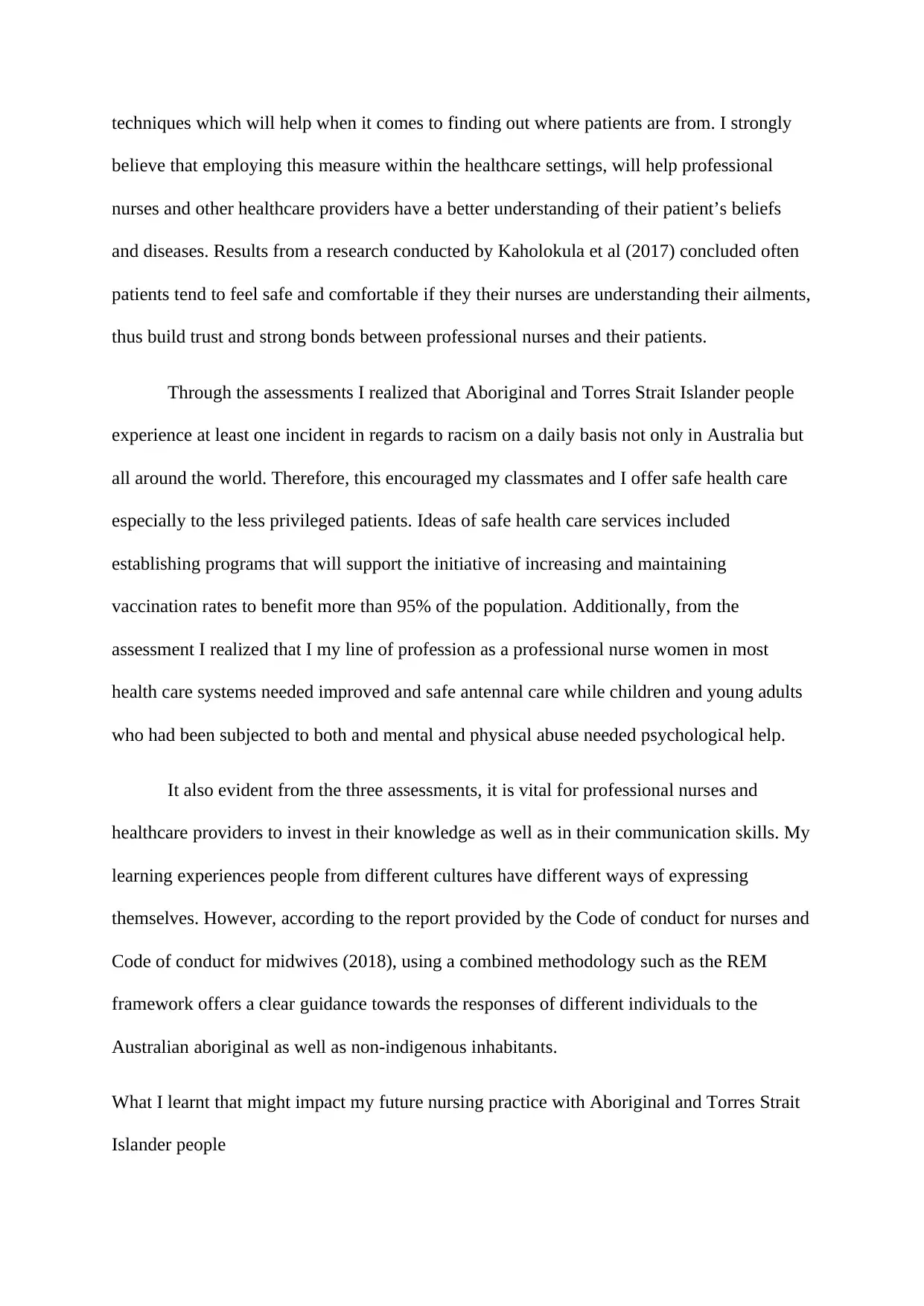
techniques which will help when it comes to finding out where patients are from. I strongly
believe that employing this measure within the healthcare settings, will help professional
nurses and other healthcare providers have a better understanding of their patient’s beliefs
and diseases. Results from a research conducted by Kaholokula et al (2017) concluded often
patients tend to feel safe and comfortable if they their nurses are understanding their ailments,
thus build trust and strong bonds between professional nurses and their patients.
Through the assessments I realized that Aboriginal and Torres Strait Islander people
experience at least one incident in regards to racism on a daily basis not only in Australia but
all around the world. Therefore, this encouraged my classmates and I offer safe health care
especially to the less privileged patients. Ideas of safe health care services included
establishing programs that will support the initiative of increasing and maintaining
vaccination rates to benefit more than 95% of the population. Additionally, from the
assessment I realized that I my line of profession as a professional nurse women in most
health care systems needed improved and safe antennal care while children and young adults
who had been subjected to both and mental and physical abuse needed psychological help.
It also evident from the three assessments, it is vital for professional nurses and
healthcare providers to invest in their knowledge as well as in their communication skills. My
learning experiences people from different cultures have different ways of expressing
themselves. However, according to the report provided by the Code of conduct for nurses and
Code of conduct for midwives (2018), using a combined methodology such as the REM
framework offers a clear guidance towards the responses of different individuals to the
Australian aboriginal as well as non-indigenous inhabitants.
What I learnt that might impact my future nursing practice with Aboriginal and Torres Strait
Islander people
believe that employing this measure within the healthcare settings, will help professional
nurses and other healthcare providers have a better understanding of their patient’s beliefs
and diseases. Results from a research conducted by Kaholokula et al (2017) concluded often
patients tend to feel safe and comfortable if they their nurses are understanding their ailments,
thus build trust and strong bonds between professional nurses and their patients.
Through the assessments I realized that Aboriginal and Torres Strait Islander people
experience at least one incident in regards to racism on a daily basis not only in Australia but
all around the world. Therefore, this encouraged my classmates and I offer safe health care
especially to the less privileged patients. Ideas of safe health care services included
establishing programs that will support the initiative of increasing and maintaining
vaccination rates to benefit more than 95% of the population. Additionally, from the
assessment I realized that I my line of profession as a professional nurse women in most
health care systems needed improved and safe antennal care while children and young adults
who had been subjected to both and mental and physical abuse needed psychological help.
It also evident from the three assessments, it is vital for professional nurses and
healthcare providers to invest in their knowledge as well as in their communication skills. My
learning experiences people from different cultures have different ways of expressing
themselves. However, according to the report provided by the Code of conduct for nurses and
Code of conduct for midwives (2018), using a combined methodology such as the REM
framework offers a clear guidance towards the responses of different individuals to the
Australian aboriginal as well as non-indigenous inhabitants.
What I learnt that might impact my future nursing practice with Aboriginal and Torres Strait
Islander people
Paraphrase This Document
Need a fresh take? Get an instant paraphrase of this document with our AI Paraphraser
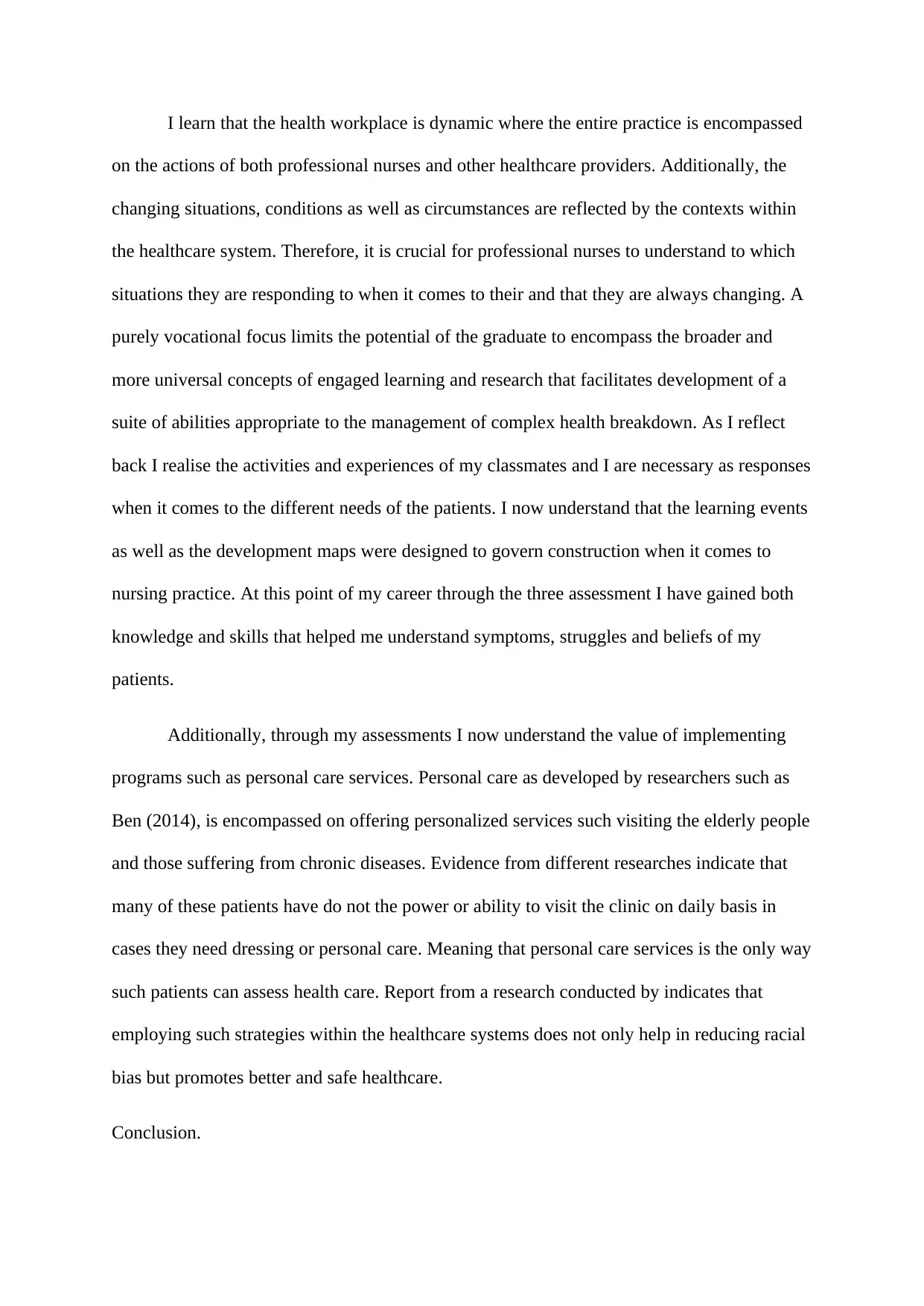
I learn that the health workplace is dynamic where the entire practice is encompassed
on the actions of both professional nurses and other healthcare providers. Additionally, the
changing situations, conditions as well as circumstances are reflected by the contexts within
the healthcare system. Therefore, it is crucial for professional nurses to understand to which
situations they are responding to when it comes to their and that they are always changing. A
purely vocational focus limits the potential of the graduate to encompass the broader and
more universal concepts of engaged learning and research that facilitates development of a
suite of abilities appropriate to the management of complex health breakdown. As I reflect
back I realise the activities and experiences of my classmates and I are necessary as responses
when it comes to the different needs of the patients. I now understand that the learning events
as well as the development maps were designed to govern construction when it comes to
nursing practice. At this point of my career through the three assessment I have gained both
knowledge and skills that helped me understand symptoms, struggles and beliefs of my
patients.
Additionally, through my assessments I now understand the value of implementing
programs such as personal care services. Personal care as developed by researchers such as
Ben (2014), is encompassed on offering personalized services such visiting the elderly people
and those suffering from chronic diseases. Evidence from different researches indicate that
many of these patients have do not the power or ability to visit the clinic on daily basis in
cases they need dressing or personal care. Meaning that personal care services is the only way
such patients can assess health care. Report from a research conducted by indicates that
employing such strategies within the healthcare systems does not only help in reducing racial
bias but promotes better and safe healthcare.
Conclusion.
on the actions of both professional nurses and other healthcare providers. Additionally, the
changing situations, conditions as well as circumstances are reflected by the contexts within
the healthcare system. Therefore, it is crucial for professional nurses to understand to which
situations they are responding to when it comes to their and that they are always changing. A
purely vocational focus limits the potential of the graduate to encompass the broader and
more universal concepts of engaged learning and research that facilitates development of a
suite of abilities appropriate to the management of complex health breakdown. As I reflect
back I realise the activities and experiences of my classmates and I are necessary as responses
when it comes to the different needs of the patients. I now understand that the learning events
as well as the development maps were designed to govern construction when it comes to
nursing practice. At this point of my career through the three assessment I have gained both
knowledge and skills that helped me understand symptoms, struggles and beliefs of my
patients.
Additionally, through my assessments I now understand the value of implementing
programs such as personal care services. Personal care as developed by researchers such as
Ben (2014), is encompassed on offering personalized services such visiting the elderly people
and those suffering from chronic diseases. Evidence from different researches indicate that
many of these patients have do not the power or ability to visit the clinic on daily basis in
cases they need dressing or personal care. Meaning that personal care services is the only way
such patients can assess health care. Report from a research conducted by indicates that
employing such strategies within the healthcare systems does not only help in reducing racial
bias but promotes better and safe healthcare.
Conclusion.
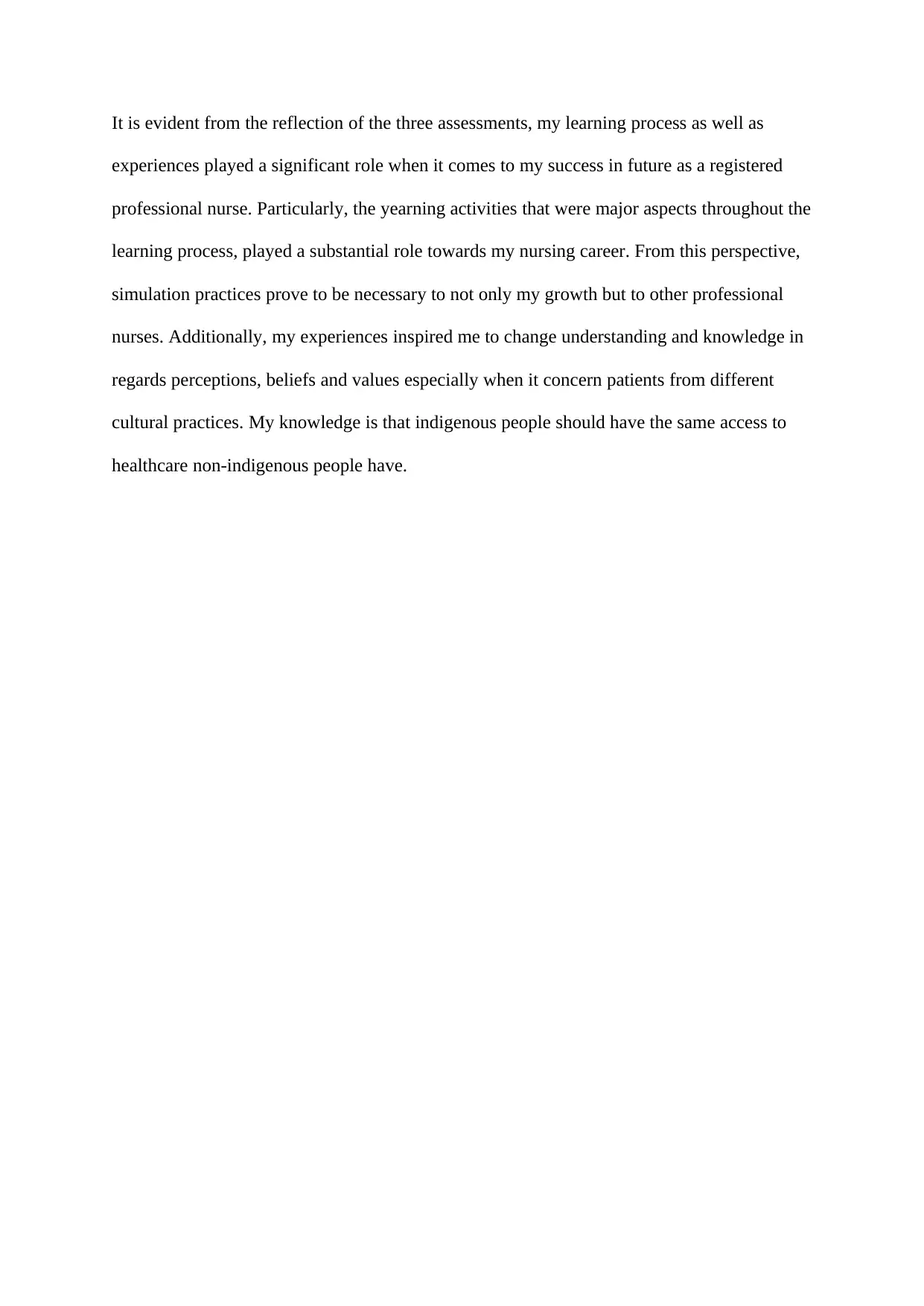
It is evident from the reflection of the three assessments, my learning process as well as
experiences played a significant role when it comes to my success in future as a registered
professional nurse. Particularly, the yearning activities that were major aspects throughout the
learning process, played a substantial role towards my nursing career. From this perspective,
simulation practices prove to be necessary to not only my growth but to other professional
nurses. Additionally, my experiences inspired me to change understanding and knowledge in
regards perceptions, beliefs and values especially when it concern patients from different
cultural practices. My knowledge is that indigenous people should have the same access to
healthcare non-indigenous people have.
experiences played a significant role when it comes to my success in future as a registered
professional nurse. Particularly, the yearning activities that were major aspects throughout the
learning process, played a substantial role towards my nursing career. From this perspective,
simulation practices prove to be necessary to not only my growth but to other professional
nurses. Additionally, my experiences inspired me to change understanding and knowledge in
regards perceptions, beliefs and values especially when it concern patients from different
cultural practices. My knowledge is that indigenous people should have the same access to
healthcare non-indigenous people have.
⊘ This is a preview!⊘
Do you want full access?
Subscribe today to unlock all pages.

Trusted by 1+ million students worldwide
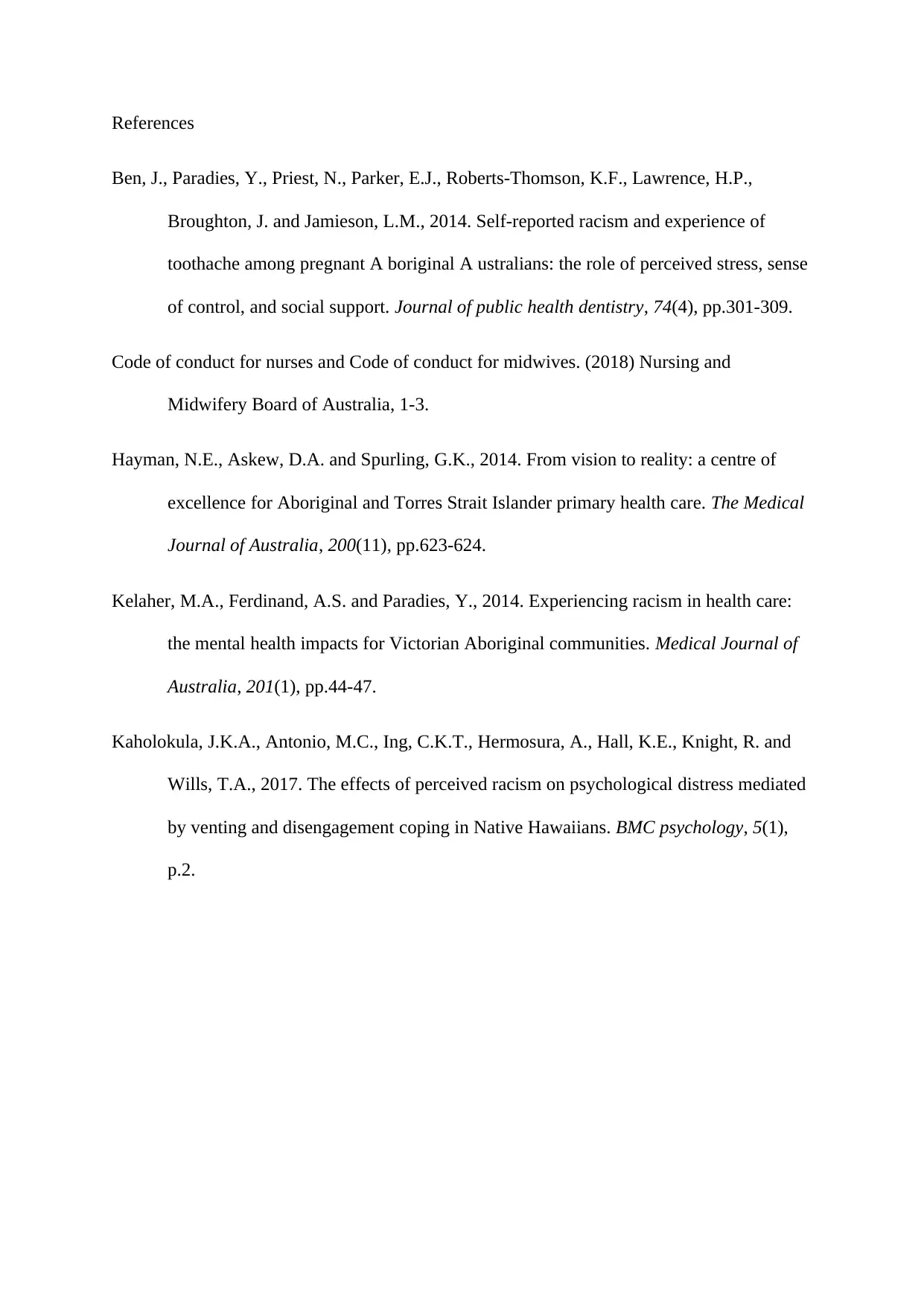
References
Ben, J., Paradies, Y., Priest, N., Parker, E.J., Roberts‐Thomson, K.F., Lawrence, H.P.,
Broughton, J. and Jamieson, L.M., 2014. Self‐reported racism and experience of
toothache among pregnant A boriginal A ustralians: the role of perceived stress, sense
of control, and social support. Journal of public health dentistry, 74(4), pp.301-309.
Code of conduct for nurses and Code of conduct for midwives. (2018) Nursing and
Midwifery Board of Australia, 1-3.
Hayman, N.E., Askew, D.A. and Spurling, G.K., 2014. From vision to reality: a centre of
excellence for Aboriginal and Torres Strait Islander primary health care. The Medical
Journal of Australia, 200(11), pp.623-624.
Kelaher, M.A., Ferdinand, A.S. and Paradies, Y., 2014. Experiencing racism in health care:
the mental health impacts for Victorian Aboriginal communities. Medical Journal of
Australia, 201(1), pp.44-47.
Kaholokula, J.K.A., Antonio, M.C., Ing, C.K.T., Hermosura, A., Hall, K.E., Knight, R. and
Wills, T.A., 2017. The effects of perceived racism on psychological distress mediated
by venting and disengagement coping in Native Hawaiians. BMC psychology, 5(1),
p.2.
Ben, J., Paradies, Y., Priest, N., Parker, E.J., Roberts‐Thomson, K.F., Lawrence, H.P.,
Broughton, J. and Jamieson, L.M., 2014. Self‐reported racism and experience of
toothache among pregnant A boriginal A ustralians: the role of perceived stress, sense
of control, and social support. Journal of public health dentistry, 74(4), pp.301-309.
Code of conduct for nurses and Code of conduct for midwives. (2018) Nursing and
Midwifery Board of Australia, 1-3.
Hayman, N.E., Askew, D.A. and Spurling, G.K., 2014. From vision to reality: a centre of
excellence for Aboriginal and Torres Strait Islander primary health care. The Medical
Journal of Australia, 200(11), pp.623-624.
Kelaher, M.A., Ferdinand, A.S. and Paradies, Y., 2014. Experiencing racism in health care:
the mental health impacts for Victorian Aboriginal communities. Medical Journal of
Australia, 201(1), pp.44-47.
Kaholokula, J.K.A., Antonio, M.C., Ing, C.K.T., Hermosura, A., Hall, K.E., Knight, R. and
Wills, T.A., 2017. The effects of perceived racism on psychological distress mediated
by venting and disengagement coping in Native Hawaiians. BMC psychology, 5(1),
p.2.
1 out of 7
Related Documents
Your All-in-One AI-Powered Toolkit for Academic Success.
+13062052269
info@desklib.com
Available 24*7 on WhatsApp / Email
![[object Object]](/_next/static/media/star-bottom.7253800d.svg)
Unlock your academic potential
Copyright © 2020–2025 A2Z Services. All Rights Reserved. Developed and managed by ZUCOL.




